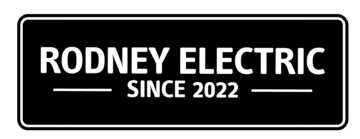Monday to Friday: 7:00 AM – 5:00 PM
Phone: 519-619-6918
Email: info@rodneyelectric.ca
ECRA/ESA LIC.: 7014791

A: The Ontario Electrical Safety Code requires that virtually any electrical work done is reported to the Electrical Safety Authority (ESA). There are some basic one to one replacements that do not require a permit, but these are few and far between. If a fire results due to electrical work done without a permit, your insurance will not cover the damages. If you hire a licensed electrical contractor, they will take care of all of this.
A: It is highly recommended that you replace any knob and tube wiring. Knob and tube is no longer permitted in any new builds, and is not compatible with most modern appliances. Over time knob and tube wiring becomes brittle, and if a live wire is exposed it poses a significant safety risk. To improve electrical efficiency, reduce the risk of blowing a fuse and mitigate the risk of fire, we recommend updating your knob and tube wiring.
A: The requirements for becoming an electrical contractor in Ontario include:
1. Completing a four-year apprenticeship program: This program includes on-the-job training and in-school training.
2. Passing the Ontario College of Trades and Apprenticeship (OCOT)certification exam: This exam tests the candidate's knowledge and skills in the electrical trade.
3. Registering with the Electrical Safety Authority (ESA): This includes passing a safety exam and meeting the other requirements set out by the ESA.
4. Obtaining a valid electrical contractor's license: This license is issued by the Electrical Safety Authority and is required to legally operate as an electrical contractor in Ontario.
5. Liability insurance: Electrical contractors in Ontario are required to have liability insurance to protect against any potential damages or injuries that may occur on the job.
6. Continuing Education: Electrical contractors in Ontario are required to complete a certain number of hours of continuing education every year to maintain their license.
It's important to note that the requirements for electrical contractor's licenses
may vary from one municipality to another and it's best to check with the relevant
authorities in your area to ensure you have the most up-to-date information.
A: Yes, electrical contractors are trained and licensed to work on both residential and commercial properties.
A: No, it's not legal to do electrical work without without a license in Canada. It is against the law and dangerous.
A: When choosing an electrician, look for a licensed and insured contractor with a good reputation and positive reviews. It's also important to make sure they have the necessary experience to handle your specific project.
A: The cost of an electrical contractor will vary depending on the scope of the project, the location, and the contractor's experience level. It's best to get a few quotes from different contractors to compare prices.
A: Electrical contractors should take all necessary safety measures, including wearing
appropriate personal protective equipment, following proper electrical safety procedures, and ensuring that all equipment and tools are properly maintained and in good working condition.
A: Common services offered by electrical contractors include installation, repair, and maintenance of electrical systems, wiring, lighting, and other electrical components for both residential and commercial properties.